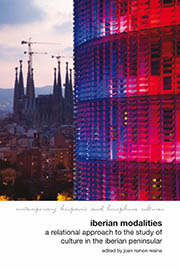Book contents
- Frontmatter
- Contents
- Preface
- List of Contributors
- Introduction: Iberian Modalities: The Logic of an Intercultural Field
- Part I Institutionalizing Iberian Studies: A Change of Paradigm
- Part II Theorizing Iberia
- Part III Iberian Dialogs
- Part IV From Sea to Iberian Sea
- 12 Immortality, Corruption, and the Sisè Seny: João de Barros's Empire of Language
- 13 The Iberian Problem: A Confederative Model for Pessoa's Heteronyms
- 14 Lisbon as Destination: Josep Pla's Iberianism through His Travels to Portugal
- Works Cited
- Index
12 - Immortality, Corruption, and the Sisè Seny: João de Barros's Empire of Language
from Part IV - From Sea to Iberian Sea
- Frontmatter
- Contents
- Preface
- List of Contributors
- Introduction: Iberian Modalities: The Logic of an Intercultural Field
- Part I Institutionalizing Iberian Studies: A Change of Paradigm
- Part II Theorizing Iberia
- Part III Iberian Dialogs
- Part IV From Sea to Iberian Sea
- 12 Immortality, Corruption, and the Sisè Seny: João de Barros's Empire of Language
- 13 The Iberian Problem: A Confederative Model for Pessoa's Heteronyms
- 14 Lisbon as Destination: Josep Pla's Iberianism through His Travels to Portugal
- Works Cited
- Index
Summary
In 1552 Portuguese humanist João de Barros published the first volume of his Décadas da Ásia, a historical account of the first half-century of Portugal's Asian empire modeled on Livy's History of Rome. In the introduction to this first volume, he speaks directly to the Portuguese king João III, offering the ailing monarch a dense and complex theorization of empire, praxis, language, the senses, and immortality. Speaking at length of the central place of historical narrative in the workings of empire, Barros weaves together three seemingly disparate threads. The first of these is an episode from the history of Alexander the Great as transmitted by Arrian and Plutarch that deals directly with the link between poetry, praxis (what Barros calls feitos), and immortality. The second involves a strategic reworking of philosophical ideas regarding immortality. The third is the theory of affatus developed at the end of the thirteenth century by the Mallorcan polymath Ramon Llull, according to which language (framed as speech) constitutes a sixth human sense.
Throughout his introduction, Barros moves adroitly from a more or less stock discussion of the role of the poet and historian in the preservation of imperial action to a fraught and tangled philosophical discussion of language itself as a tool of empire and immortality. Beginning with classical Greek notions of corruption and reproduction, Barros (turning to Llull) moves into a discussion of language as a bodily sense and then develops a theory of written language that links the latter at once to the divine and the sensible, imbuing it with the power to bestow immortality upon human actions.
- Type
- Chapter
- Information
- Iberian ModalitiesA Relational Approach to the Study of Culture in the Iberian Peninsula, pp. 197 - 211Publisher: Liverpool University PressPrint publication year: 2013



